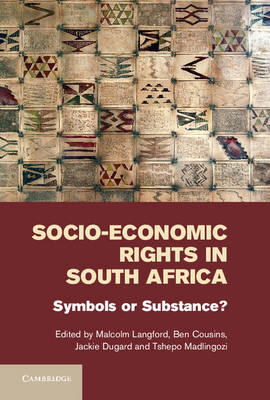
Socio-Economic Rights in South Africa
Cambridge University Press (Verlag)
978-1-107-02114-3 (ISBN)
The embrace of socio-economic rights in South Africa has featured prominently in scholarship on constitution making, legal jurisprudence and social mobilisation. But the development has attracted critics who claim that this turn to rights has not generated social transformation in practice. This book sets out to assess one part of the puzzle and asks what has been the role and impact of socio-economic strategies used by civil society actors. Focusing on a range of socio-economic rights and national trends in law and political economy, the book's authors show how socio-economic rights have influenced the development of civil society discourse and action. The evidence suggests that some strategies have achieved material and political impact but this is conditional on the nature of the claim, degree of mobilisation and alliance building, and underlying constraints.
Malcolm Langford is a Research Fellow at the Norwegian Centre for Human Rights, Faculty of Law, University of Oslo, and Director of the Centre's Socio-Economic Rights Programme. He leads a number of international research networks, is an adviser to different UN agencies, governments and NGOs, and has been a visiting fellow and professor at a number of universities. He has published widely on human rights issues in law, economics and development as well as political science. His books include The International Covenant on Economic, Social and Cultural Rights, with M. Craven (2013); The MDGs and Human Rights: Past, Present and Future, edited with A. Sumner and A. E. Yamin Russell (2013); and Social Rights Jurisprudence: Emerging Trends in International and Comparative Law (2008). Ben Cousins holds a DST/NRF Research Chair and is based at the Institute of Poverty, Land and Agrarian Studies in the School of Government, University of the Western Cape, which he founded in 1995. He has worked in agricultural training and extension in the UK, Swaziland and Zimbabwe, and undertaken research on land tenure, agriculture, and land and agrarian reform in Zimbabwe and South Africa. His books include At the Crossroads: Land and Agrarian Reform in South Africa into the 21st Century (edited, 2000) and Land, Power and Custom: Controversies Generated by South Africa's Communal Land Rights Act (co-edited with Aninka Claassens, 2008). Jackie Dugard is Executive Director of the Socio-Economic Rights Institute of South Africa, which she co-founded in January 2010. She is also a Visiting Senior Fellow at the School of Law, University of the Witwatersrand. Dugard's areas of expertise are socio-economic rights, socio-legal studies, and access to basic services and justice for the poor. She has published widely on the role of law in affecting socio-economic change, as well as on basic services-related rights and access to courts. Tshepo Madlingozi is a Senior Lecturer at the Faculty of Law, University of Pretoria. He is a member of the editorial committee of the African Human Rights Law Journal, a member of the management committee of the Pretoria University Law Press and a member of the Board of Trustees of several NGOs. He has undertaken consultancy work for various intergovernmental institutions and NGOs including the AU Pan-African Parliament and the UN Office of the High Commissioner for Human Rights. He has published in journals such as the Journal of Law and Society and the Journal of Human Rights Practice.
1. Introduction: civil society and rights Malcolm Langford; Part I. Context and Contestation: 2. Constitutional jurisprudence: the first and second waves Stuart Wilson and Jackie Dugard; 3. Socio-economic rights beyond the public/private law divide Sandra Liebenberg; 4. Post-apartheid social movements and legal mobilisation Tshepo Madlingozi; 5. Political power: social pacting, human rights and the development agenda Adam Habib; Part II. Thematic Areas: 6. Rural land tenure: the potential and limits of rights-based approaches Ben Cousins and Ruth Hall; 7. Housing rights litigation: Grootboom and beyond Malcolm Langford; 8. Health rights: politics, places and the need for 'sites for rights' Peris Jones and Nyasha Chingore; 9. Social security rights: campaigns and courts Beth Goldblatt and Solange Rosa; 10. Urban basic services: rights, reality and resistance Jackie Dugard; 11. Realising environmental rights: civic action, leverage, and litigation Rachel Wynberg and David Fig; 12. Access to information and socio-economic rights: a theory of change in practice Kristina Bentley and Richard Calland; 13. Gender and socio-economic rights: the case of gender-based violence and health Liesl Gerntholtz and Jennifer MacLeod; 14. Migrants and mobilisation around socio-economic rights Tara Polzer Ngwato and Zaheera Jinnah; 15. Concluding perspectives Malcolm Langford, Jackie Dugard, Tshepo Madlingozi and Ben Cousins.
| Zusatzinfo | 19 Tables, unspecified; 4 Halftones, unspecified; 6 Line drawings, unspecified |
|---|---|
| Verlagsort | Cambridge |
| Sprache | englisch |
| Maße | 152 x 229 mm |
| Gewicht | 820 g |
| Themenwelt | Recht / Steuern ► EU / Internationales Recht |
| Recht / Steuern ► Öffentliches Recht ► Verfassungsrecht | |
| ISBN-10 | 1-107-02114-6 / 1107021146 |
| ISBN-13 | 978-1-107-02114-3 / 9781107021143 |
| Zustand | Neuware |
| Haben Sie eine Frage zum Produkt? |
aus dem Bereich


